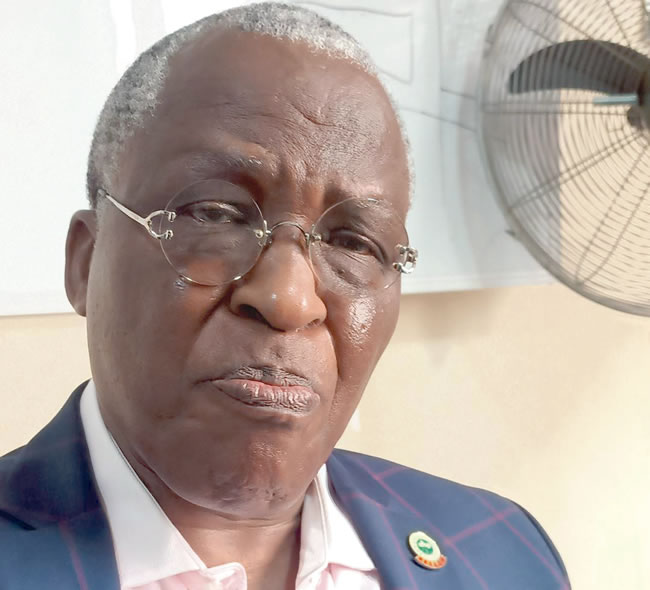Only few cities in Nigeria have plans —NITP President
[ad_1]
Olutoyin Ayinde is the President of the Nigerian Institute of Town Planners (NITP). In this interview with DAYO AYEYEMI, the number one town planner in Nigeria says there is a connection between physical planning development and urban security. He blames the lack of understanding of physical planning by political heads for poor urban development in the country.
The theme for this year’s national conference of NITP is centred on urban security. What are you projecting?
There are lots of views that we don’t know that has to do with planning. One of them is security. I will give you an example: when I was in secondary school, my social studies teacher taught me to draw a map of Nigeria. It was bounded in the North by Niger, in the East by Cameroun, and in the West by Benin Republic and in the South by the Atlantic Ocean. The population of Nigeria was 56 million people in 1971. Last year, 2021, was exactly 50 years after 1971, and Nigeria still has the same map. Bakassi has been taken away and Lake Chad dried up. This already shows that part of what we called our land in 1971 has been reduced. But what is our population? It is over 220 million. So, one resource, one territory that 56 million people once depended on now becomes what 220 million people depend on.
Aren’t you seeing security concerns? Have you imagined some settlements – the hinterland – that have lived together for more than two centuries and there was no problem; nobody was identifying what, they were intermingled. Now, there are inter-communal clashes. What are they fighting over? Land. The only way to manage what is insufficient is to plan. You divide it among the people, divide it among the needs – the land uses. This can only be done by policies. For example, you find in developed countries have housing policies – public housing policies. It encourages corporations, cooperatives and councils to build en-mass.
This takes off the burden on individuals to build. So when you have an accommodation problem, what will be working on your mind is: which of the estates do I subscribe to? Is it the one driven by cooperatives, driven by corporations, driven by councils? You don’t do the physical building yourself. But where there is no such policy, like we have none here, everybody is left to self-help. So when you have an accommodation problem in our clime, what will you be asking for is land. Where can I get land?
We are personating our land to individuals and we are spreading rather than building up. This is making a lot of nonsense about our urban fabrics. That is not what you have in those places where they have policies. The houses are similar, they are built in the same shape. Sometimes, they build the same colour and can colour by zones. They can also replicate these estates from one part of the city to another. They can replicate what they have in this city in another city. So you see that rhythm. That is a sequence. This is a result of planning.
So this makes you secure. What brings insecurity is the fear of inadequacy. Something as simple as the distribution of a programme in an event can cause a fight. It is a planning issue. Anytime there is scarcity you have to plan. This is why this year’s conference is very important. We have invited security experts; we have invited the Minister of Defense, and each arm of the armed forces will be there.
You have been the President of NITP for almost two years now. What has been the experience?
It has been challenging, it has been exciting, it has been a privilege to lead and a privilege to be tagged number one town planner in Nigeria. For me, it’s a position not to be taken for granted. I always tell people that when they find themselves in an office like that, it is not because they are the best; it is just because they are privileged. So for me, it’s a privilege to have been able to lead this administration for almost two years, and it’s really more exciting when you see people appreciating what you have done, acknowledging the intervention you have done in one way or the other, and praising one innovation or the other that you did. So, that is why I said it has been exciting.
However, it has been challenging in the sense that, the country called Nigeria is yet to embrace physical planning. Unfortunately, that is the base of every development. It is a springboard. Once you are not planning, you cannot develop. So the reason we are where we are is that we are not planning.
What are the challenges?
One of the things I realised is that planning is not visible enough as a profession. As a matter of fact, what people think is planning is exactly what is not planning. So, the majority of Nigerians, including the political heads at the state and national levels, don’t even understand what planning means. That is the first challenge. Once those in leadership positions don’t understand what planning is, how would the masses understand? They did not understand for example, that there is a sequence between planning and development. The sequence is that you plan and then develop. Anytime that you developed and you want to plan, it is an irreversible thing except you want to break, which is what we usually do.
Anytime you see us breaking houses because you want to widen roads, proves that we did not plan. If we had planned we would have left that right of way. If somebody encroaches the right of way, the person will know that he has encroached. Our cities don’t have plans. Only few cities in Nigeria have plans. The ones that have plans, are not being implemented. There are plans that are already old. In Kaduna State, the governor says he is implementing the Master Plan of Kaduna that was done in the sixties or seventies. That is not how to implement plans. Plans are meant to be reviewed. You won’t know this until you understand that human settlements are living organisms, just like human beings.
ALSO READ FROM NIGERIAN TRIBUNE
You cannot put the cloth you used 30 years ago on now because you were younger then. What you needed then was different from what you need now. You needed a large banking hall before, now small spaces. This is the reason why plans should be reviewed and made functional so that people can live their lives without stress. These are things that we did not understand in Nigeria. We did not understand that as big as Lagos State is, it can be demarcated into various development areas and each development area can grow on its own with its own centre.
You can actually live in a development area, and do business there without going elsewhere, thereby making the burden on the roads lighter as traffic reduces. Technology has helped. You can do virtual meetings and you don’t need to go on the roads. This is why planners are supposed to be working, collecting data and doing studies regularly to fit into the system that makes the plan reviewable from time to time. It is not happening in Nigeria. And because we have failed to plan, physical planning is absent, so development becomes twisted, abnormal, lacks a rhythm, and lacks order.
When you plan, you are trying to put things in order but the moment you are not building according to a plan, it means you are just allocating space anyhow, building roads anyhow. Cities are consciously planned.
[ad_2]















Post Comment